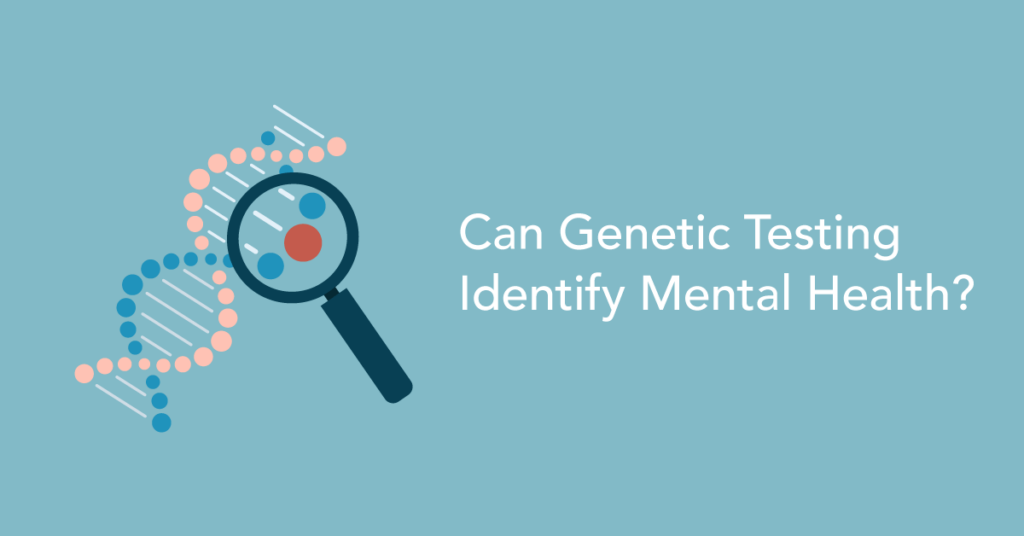Genetic testing can inform, but not diagnose:
May guide medication choices
Doesn’t predict specific mental illnesses
Best used alongside clinical evaluation
Genetic testing has grown in popularity over recent years. It’s used to detect health risks and conditions, help with family planning and conduct newborn screening. It’s also used for research purposes. But is there a space for genetic testing for mental illness? The answer is a bit more complicated than you might think. Simply put, genetic testing has great potential in the mental health field, but it’s currently being used in limited ways. Let’s examine what’s being done with genetic testing for mental illness and what the future potentially holds for this service.
Is Mental Illness Hereditary?
Before discussing genetic testing, it’s essential to understand the basics of what role genetics plays in mental health conditions. Is mental illness genetic? Yes, mental health conditions can be genetic, but a single gene never causes an illness. Certain genes can increase the risk of developing a mental illness, but the presence of that gene won’t be the entire reason for a condition to develop. Some gene variants are linked with specific mental health conditions, such as autism, anxiety, bipolar disorder, schizophrenia and attention deficit hyperactivity disorder. Additionally, these conditions tend to impact several people in families, further verifying the genetic component of mental health illness. A commonly cited example of genetics influencing mental health conditions relates to anxiety and depression. Distinct genes that control serotonin and dopamine have been identified as increasing the risk of anxiety and depression in an individual. When it comes to depression, research shows approximately 50% of cases are hereditary, while 50% are unrelated to genes. Another strong example of genetics in mental health is that people with schizophrenia and bipolar disease sometimes experience changes in genes related to brain development and function. Still, it’s essential to understand that people don’t necessarily inherit a mental health condition from their mother or father. Children receive a unique combination of genes from each of their parents. In some cases, this unique gene combination can predispose a child to specific mental health conditions. Overall, the onset of mental health issues is believed to be the result of a combination of genetic, environmental and societal factors. Someone might have a gene that predisposes them to depression, but environmental and societal factors may influence whether the individual develops depression.Genetic Testing for Mental Illness
Genetic testing is used to predict some diseases, such as cancer. However, as of 2024, genetic testing can’t accurately predict or diagnose mental health conditions. As science continues to advance, this may be a possibility in the future. Of course, we do know of some genetics linked to specific mental illnesses, and testing people for the presence of these genes is possible. But identifying the presence of a gene that makes an individual susceptible to a mental health issue isn’t very useful. That’s because, as mentioned above, the presence of the gene itself isn’t enough to confirm the condition will manifest. Instead, it simply identifies a potential risk. Ultimately, the combination of genetics with environment and societal factors determine if the mental health condition develops. One area where genetic testing is being used effectively for mental health is within the treatment and medication space. Psychiatrists have started using genetic testing to understand how patients respond to specific medications. Genetic testing helps therapists identify specific genetic markers (also known as pharmacogenetic markers) that can indicate whether medications will be effective for a patient. This testing can sometimes highlight whether an increased risk exists for the individual to develop adverse side effects from the prescription. For example, a genetic test can reveal someone responds poorly to selective serotonin reuptake inhibitors. Medications in this class are most commonly prescribed for depression and are often a psychiatrist’s first choice when helping a patient who’s depressed. A quick genetic test that shows someone won’t respond well to SSRIs allows the therapist to explore other medication options. The benefits of participating in genetic testing for mental health prescriptions are clear. Patients don’t have to spend weeks or months testing medications less likely to work for them. This time saved is hugely beneficial for the patient’s overall treatment. First, they’re less likely to get frustrated and give up on treatment due to ineffective medication. Second, getting access to the proper medicine immediately means the patient can see an improvement in their symptoms faster. Genetic testing for pharmacogenetic markers is fairly new and isn’t done widely by all therapists and mental health treatment centers yet. Contact your therapist directly to see if they offer this service. Your therapist must be trained in genetic testing so they can interpret the results and provide informed recommendations. Additionally, if you’re contemplating genetic testing, you should be aware of some of the ethical considerations for this service. Notably, you should understand how the testing company protects your privacy so your genetic results aren’t shared or used in any way you don’t consent to.Find a Therapist Who Does Genetic Testing With Mental Health Hotline
If genetic testing for pharmacogenetic markers interests you, the next step is to find a participating therapist. Mental Health Hotline can help you find that connection. We partner with reputable mental health care providers nationwide to get you the help you need. Reach out today — someone’s here for you 24 hours a day.Editorial Team
-
 Written By: Mental Health Hotline
Written By: Mental Health HotlineMental Health Hotline provides free, confidential support for individuals navigating mental health challenges and treatment options. Our content is created by a team of advocates and writers dedicated to offering clear, compassionate, and stigma-free information to help you take the next step toward healing.


